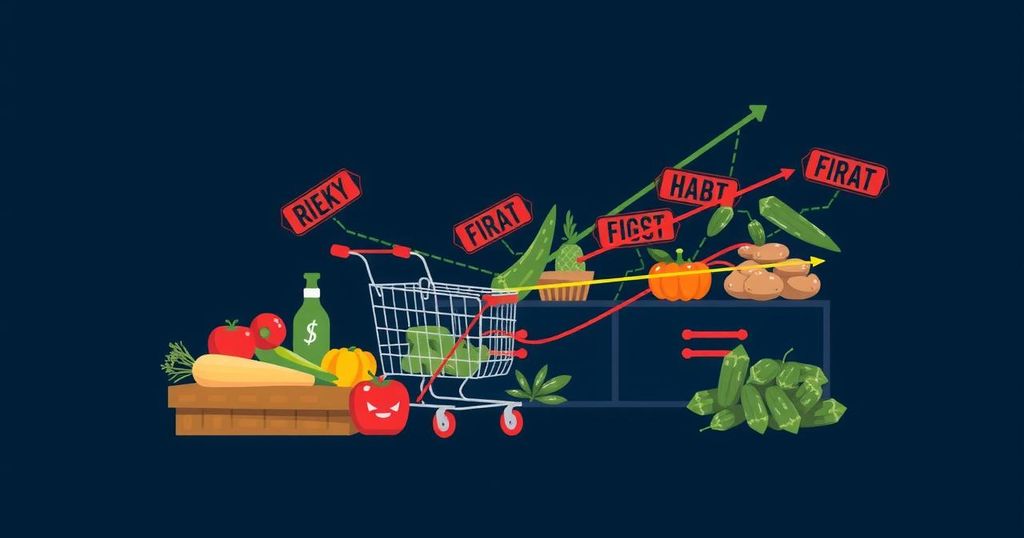Business
economics
ASIA, BRAZIL, CUBA, DEMOCRATS, DONALD TRUMP, ECONOMICS, ECONOMY, EUROPE, FLORIDA, FOOD INFLATION, INDIA, INFLATION, JAMES MEADWAY, LIBERAL DEMOCRATIC, LIBERAL DEMOCRATIC PARTY, MEDITERRANEAN, NA, NARENDRA MODI, NORTH AMERICA, SOUTH AMERICA, TRUMP, UNEMPLOYMENT RATE
Leila Ramsay
0 Comments
How Rising Grocery Prices Shape Global Political Landscapes in the Era of Climate Change
Sharp increases in grocery prices have influenced US elections significantly, with Republicans benefitting from widespread voter hardship. This trend is mirrored in other global economies, notably India and Japan, where incumbents faced electoral setbacks due to rising essential costs. Climate change exacerbates these issues, undermining traditional economic models and necessitating a strategic reevaluation of policies to combat inflation and ensure food security.
In the recent electoral landscape of the United States, soaring grocery prices have significantly influenced voter sentiment, aligning many with the Republican Party. Voter reports indicate that approximately 75% of Republican voters experienced financial hardship due to rising prices, whereas only 25% of Democrats felt similarly. In this context, Donald Trump’s inquiry regarding national wellbeing over the past four years yielded a predominantly negative response, highlighting widespread dissatisfaction among voters. This trend is not isolated to the United States; globally, rising essential costs are reshaping electoral dynamics. In India, Prime Minister Narendra Modi’s government faced a setback, losing its parliamentary majority as voters expressed significant concern over food price inflation, which has averaged 8%—with rice prices hitting a decade-high. Similarly, Japan’s ruling coalition lost its majority amid staggering rice price increases, caused by both climatic factors and economic pressures. Widespread price surges are observed in various countries. For instance, in the UK, supermarket olive oil prices surged by approximately 90% due to climatic conditions impacting harvests, while Europe faced over an 80% rise in butter prices linked to livestock health issues exacerbated by climate change. Concurrently, the United States recorded a doubling of orange juice prices, driven by disasters affecting key agricultural regions. Agricultural price volatility reflects the overarching effects of climate change, as escalating weather-related disruptions imperil food production and magnify the opportunity for price profiteering. Furthermore, conventional economic models that report on aggregate statistics fail to adequately represent individual household experiences of inflation, often leading to the mischaracterization of economic health. Official data may indicate a thriving economy; however, this does not correlate with the lived experiences of many citizens who find essentials increasingly unaffordable. The current economic landscape necessitates reevaluation of traditional inflation control measures, which have proven ineffective in combating the ramifications of supply shocks. While historical patterns maintained consistent prices due to stable global conditions, recent geopolitical conflicts and climatic crises have transitioned us into a realm of unpredictability characterized by both price inflation and opportunistic profiteering among a select few entities throughout the agricultural sector. To address these systemic challenges, three strategic measures are proposed: first, imposing taxes on the recent wealth amassed by exploitative practices in the agricultural sector; second, dismantling ineffective conventional economic policies that exacerbate inflationary pressures; and third, reconstructing supply systems to cultivate resilient local production and robust support for agricultural communities affected by climate change.
The article discusses the relationship between soaring grocery prices and political shifts, particularly in the context of recent elections in the US and other major economies. It illustrates how essential commodity price increases have led to voter discontent with incumbent parties, citing examples from India and Japan. The impact of climate change on food production and the subsequent rise in prices is a central theme, emphasizing the failure of traditional economic indicators to accurately reflect the struggles faced by households, particularly those of lower income. Furthermore, it advocates for reforms in economic policy and agricultural systems to better navigate the ongoing crisis.
In conclusion, the rising costs of essential goods have profound political ramifications, reshaping electoral landscapes as citizens grapple with inflation driven by climate change and global instability. The article emphasizes the necessity for systemic reform, advocating for wealth redistribution, responsive economic policies, and the localization of agricultural production to fortify food security and address the challenges of a changing climate.
Original Source: www.theguardian.com




Post Comment